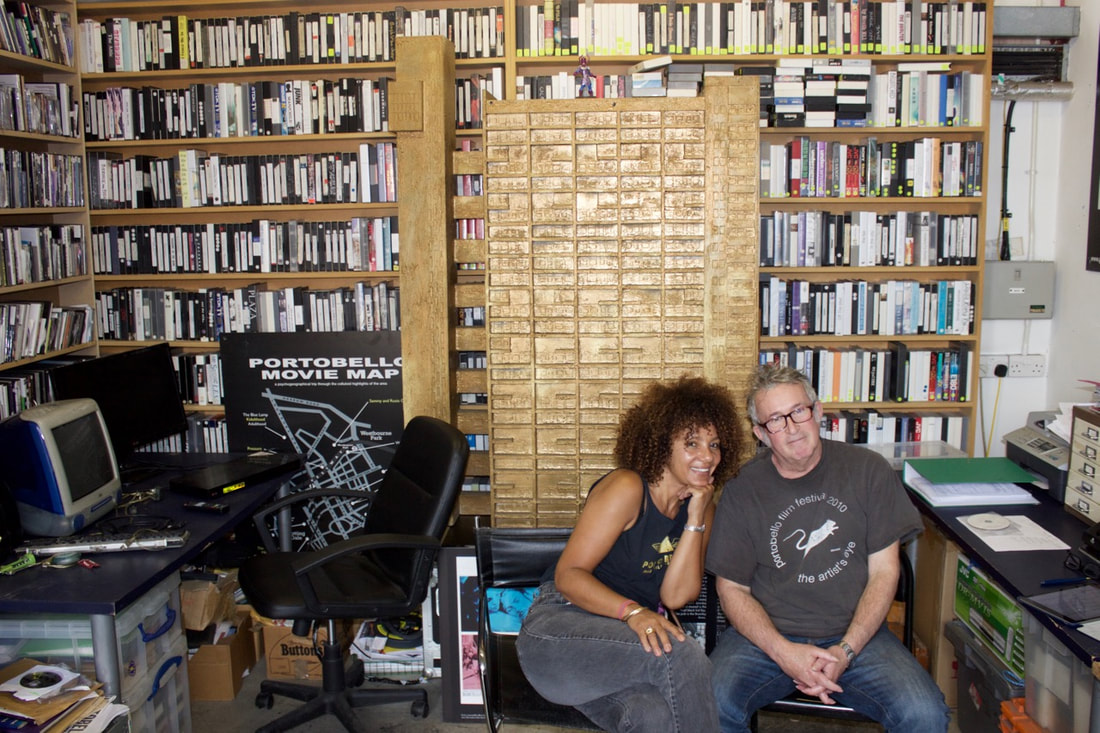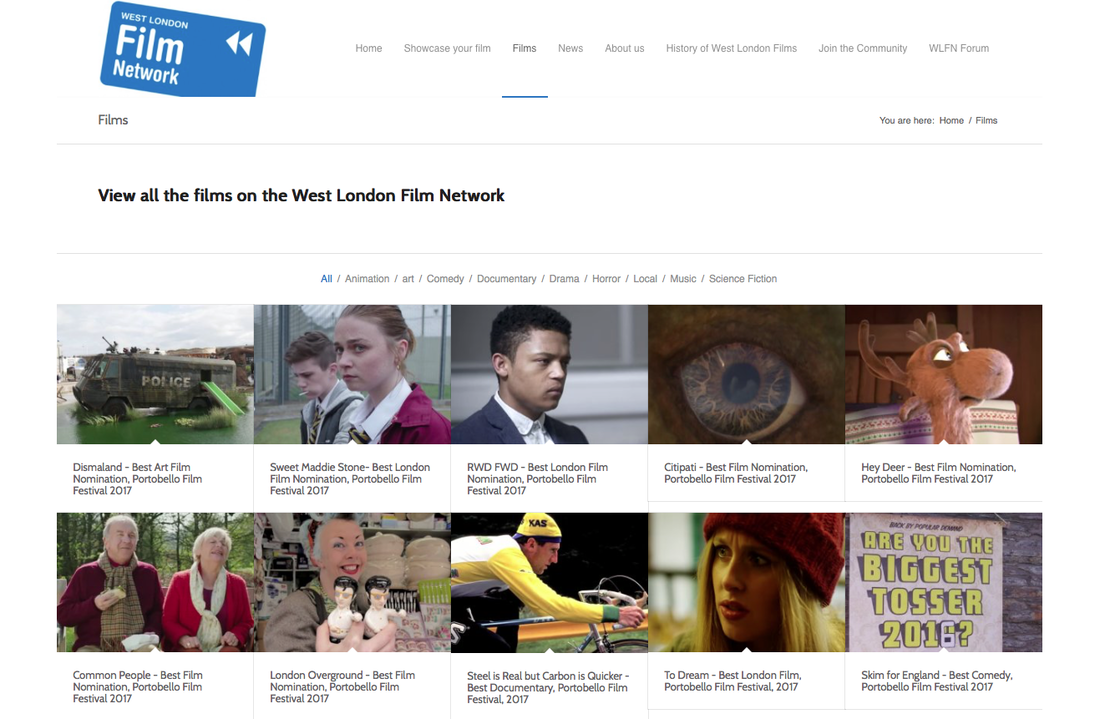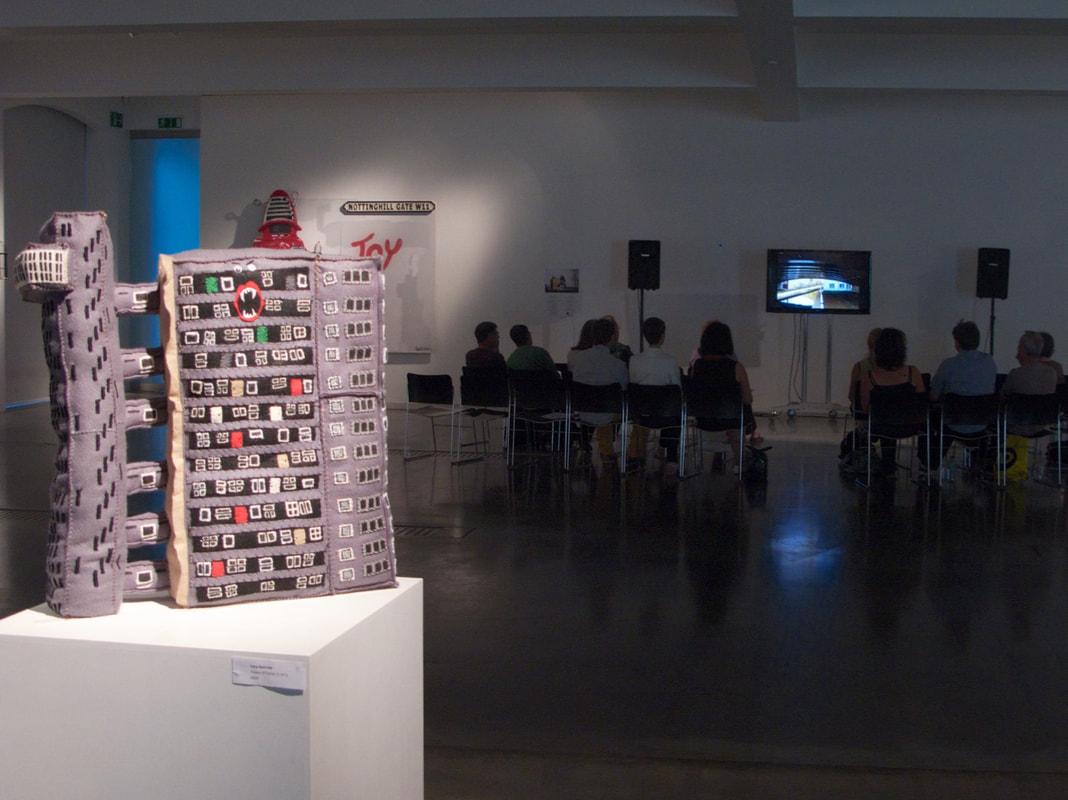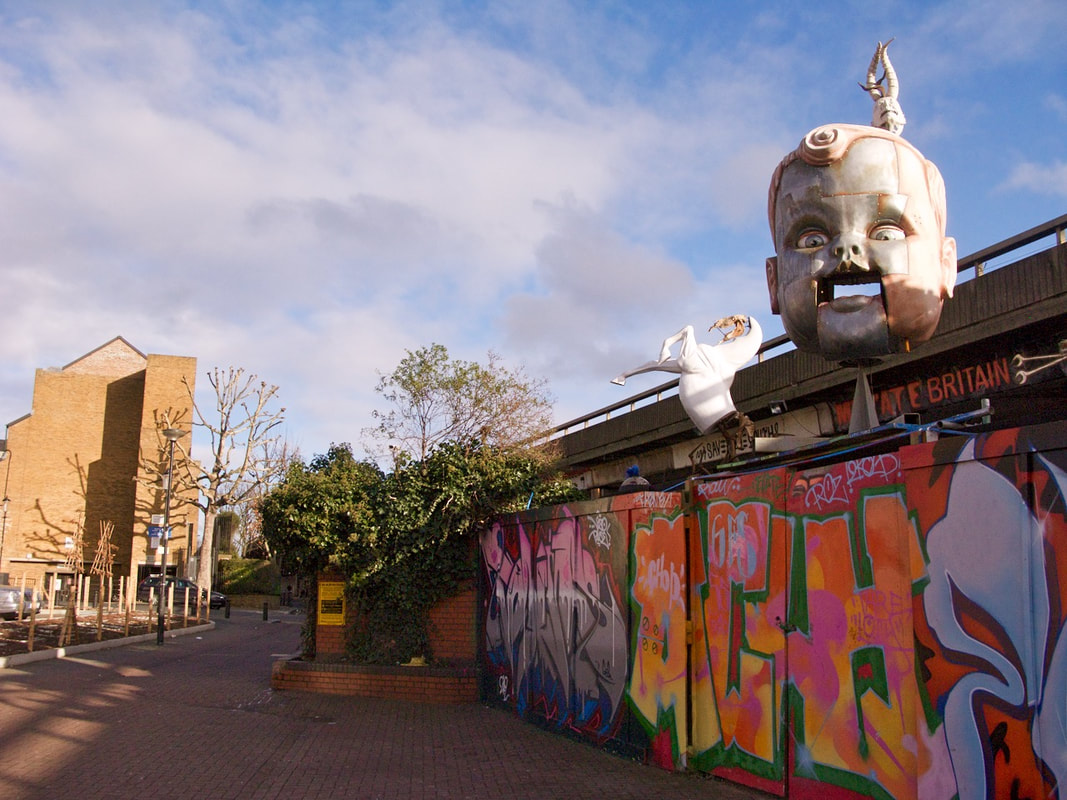|
The following is a conversation with Jonathan Barnett and Leona Flude, Portobello Film Festival director and co-ordinator respectively. They discuss a range of topics: the origins and ethos of the 23 year old film festival; the pleasures and pitfalls of independent film making and exhibition; the supremacy of European and world cinema over the current British scene; and the future of the festival. Constantine Gras will be curating a 2 hour programme of short films during the festival in September 2019 at the Gate Cinema Notting Hill. This will be called Male Emotion and Economics: The History of British Film from Cecil Hepworth to Derek Jarman and beyond. This will also be a site specific event with actors telling the story of the Gate Cinema, one of the first electric picture palaces to open up in 1911 at the dawn of the British film industry. Short films being screened include Jonathan Barnett's portrait of R.D. Laing (1984) , Adam Ritchie's Room 1301 (1965) and Constantine Gras's The Strawberries Are For The Future (2019). In addition, there will be another programme of films drawing on our local history and includes Washing Dirty Linen in Public (2019) and North Kensington Laundry Blues (1974); the latter is a film about the campaign to save the Silchester Road bath and wash house and has never been screened before. Jonathan Barnett: I used to be a roadie for a band called Here and Now who came from Ladbroke Grove. The big thing that they used to do was free festivals and free music. There was this free music thing happening in the Grove in the late 1970s, early 80s. At the time this whole area used to be really run down, a slum. You wouldn’t believe it now. But out of slums comes a great deal of creativity. And I was totally into all of this. Then these VHS camcorders came out so you could actually make a film for next to nothing which you couldn’t do before-hand. What got me going was the original video for The Message by Grandmaster Flash. It was filmed on VHS in the streets of New York and you could almost touch it. It was so real. And the fact that it was little bit amateurish actually made it look better than the stuff that was horribly professional. It also meant the means of production and distribution weren’t owned by the state. It was owned by ordinary people who could make films. So I filmed the carnival in 1982 and basically that’s what I did for ten years. I just filmed anybody that I thought was interesting with my VHS camcorder. Also around the beginning of the 1990s you started to get digital technology coming in. So this was the context for why we decided to do the film festival. It was started by these people called Massive Videos that was run by Barney Platts-Mills and Ghanim Shubber. Barney made these amazing films called Bronco Bullfrog and Private Road in the early 1970s. He was into making film with kids off the street and he wanted to have a festival. They got money from City Challenge and started the Portobello Free Festival. This was around 1996 and they didn’t charge filmmakers for showing or people for admission. The first two years we were in tents on Athlone gardens which was great. It was just supposed to be a platform for all those people making films and who had nowhere to show them. Definitely came out of the genius loci of this area which used to be a frontline for innovation and we were the place that did counter-culture in terms of film. Leona Flude: I was born around here and I think I met Barney via Courttia Newland who is a writer and is actually doing something now with Steve McQueen for TV. I used to go to school with Courttia and there was a group of us from Ladbroke Grove who started to go to Massive Video. Barney, Ghanim and Jonathan were there and telling us, yeah guys, make a film, just make a film. So everyone just mucked in. Someone would write a script, then we would go somewhere and film it. Then it got to a stage with needing to show these films somewhere. So the idea was conceived of having a film festival and it went on from there. But I have to say that without Barney and Ghanim, the festival would never have happened. They were amazing and inspiring, giving life and confidence to young people from the area who never thought that film was in their remit. JB: I always thought the Portobello Film Festival needed a Banksy figure. The tools are there now and anyone can make a film on a budget of nothing if they want to. But not a lot of the films are very good because they are self-indulgent. It’s the selfie-generation rather than someone who wants to tell a story. But there will be people able to use this technology and make a really brilliant film. Obviously, the documentary is the easiest one, because you just find someone who is interesting and you point the camera at them. Also it’s more intimate in a way if you are doing it yourself, rather than a great big camera crew and everything. The secret? It’s got to be interesting to other people. That’s the thing about Banksy. He is street art, but everybody loves it. We need a film maker doing the same thing, with a bit of story to it or somebody interesting acting in it with a bit of star quality. I suppose it’s only just happened. We’ve only had digital for a short while, so it will take a bit of time for people to get used to it. JB: What are the stand-out films? Guy Ritchie had his first film with us and also Shane Meadows. Sarah Gavron who made the feature Suffragettes in 2015, we had her film when she was a student at the National Film and Television School. Arguably, the films were better in those early days. L: They had a bit more depth to them. Nowadays they are all so self-obsessed and if you find a film has really high production values, it’s usually quite dull, which is such a shame. It is difficult sitting through those films sometimes. But the European films are amazing. JB: Yes. The European stuff tends to be of a higher quality, more challenging. I think film is regarded more highly as an art form on the continent than it is in England. Particularly good films are coming out of Spain and Ireland and Germany. L: And Russia. You just think to yourself, how are these people having these great ideas for films. JB: We get a lot of dramas that can be a bit dreary. L: Especially the one’s about crime. JB: Yes. They are made by middle-class people who probably don’t know anything about crime. There has always been good animation L: And The British films usually do good comedy. JB: The whole point is you make a film and other people have to watch it. So you want to leave them in a higher state than when they came into it. That’s what a work of art is about. People have to realise that they can do absolutely anything they want and they should not be trying to conform; if they want to conform, fair enough, go to film school and get a job as assistant director at the BBC. But if you want to be creative, use these tools that are available to you and do absolutely anything you want. The whole idea of a short is brilliant, because you can distill all of your bestness into ten minutes and that’s really quite exciting and a challenging thing to do. L: We have had a few really really good films. The one for me was German. It was an arty film about a guy smoking cigarettes. It was black and white and won best film or best art film probably over 10 years ago now. JB: N from last year was quite good. That was a send up of German expressionist films. It was clever and it wasn’t too long. L: And Jermaine and Elsie set in Ladbroke Grove about a guy looking after that older woman. JB: Yes. It was about this guy who was a carer for an old lady and it turned out that she was a racist. And he was black and gay. But she ended up really liking him. L: Cass Pennant used to submit a film every year and he’s gone on to do really good things for Netflix. The work he showed here was about football fans. JB: Casuals was about Millwall fans and their whole culture, the clothes they wore. That film was great. We’ve had a few top directors. Julian Temple showed his London Babylon here. And Mike Figgis. The last few years we are getting stuff from the Ken Russell siblings. L: I have to say that one of the best stand out evenings was the screening of The Passion of Joan of Arc that was made in 1928. JB: That was fantastic. In The Nursery did the soundtrack live with synthesisers that had these sound effects like bells. The actress who played Joan of Arc was amazing, her acting, her face. And to think they found that print in a can that was dumped in the back of someones house. L: For me that is the best. I didn’t need to go to another film festival after that. JB: One of the most exciting evenings we had was with Chris Cunningham. He used to do adverts and pop videos for people like Bjork. He was obviously the darling of the advertising world and we had this weird film of his, Rubber Johnny, a Frances Bacon type film. One minute there was nobody there and then about 500 people turned up and we could hardly fit them into Westbourne studios. L: The queue went all the way around. I knew who he was, but I didn’t know he was that big. And it was like what the fuck! We also had another great evening with Ladj Ly and he won at Cannes this year. JB: Yes! From a film called Les Miserables but I don'’t know if it was the original book. Ladj Ly came from one of the Paris suburbs. Whatever you say about England, it's far more integrated than France. Anyone who is ethnic minority they just whack them out to the suburbs, to the ghastly ghettos. So that’s where he’s from and they had a year of riots there and this guy filmed all the riots. L: And we brought their production team over here to the festival and had a great evening. I'm wondering if things were almost more exciting back then. JB: Culture has got very standardised of late. But one thing you do get at the festival, because we are kind of street level, is you get things when they are just starting out. The mainstream pick up on those good films that you first see at Portobello. L: And also I think from the film festival being free. There’s so many more free film events around London. JB: It’s inspired other people to do the same thing, which is great. Free is terrific. We have to thank the sponsors over the years for that including the Royal Borough of Kensington and Chelsea and The Westway Development Trust. We have this organic festival. It goes where it goes. We are not leading it anywhere apart from the fact that we are trying to keep it free. The foreign side of it which is programmed by Raymond Myndiuk will always be there because the foreign films are so good and they send them to us in droves. This year, we are doing three weeks at the Muse gallery with non-stop foreign films every evening. JB: Tim Burke who sadly passed away recently helped start the Pop Up Cinema under the Westway. It started when the Mutoid Waste Company did a thing there one Christmas. They turned a Wessex helicopter into a spider and they had all the top graffiti artist there. Chris Bailey from the Westway Development Trust brought in Barney who then involved us. I wanted to get in a cheap projector, but Tim said - no let’s do it with a professional one. He got that in and a giant screen, The containers were our idea. The top one being the projector booth. And so we started the summer after the Mutoids had been there. Tim was putting on stuff throughout the year. We had Dave Pitt from Inn on the green doing the bar and on a nice day it was a great place to hang out. We were at the Pop Up from 2010 to 2015. L: We would love to go back. JB: It’s hard not being there. We are trying to make film a live experience and that was the perfect venue. They say it’s location, location, location. We got twice as many people at the Pop Up because it’s on Portobello Road and it always used to be full at 5.30 before we start at 6. There was an excitement in the air. So the last three years have been a bit of a struggle. L: With us not being at the Pop Up, it's like we don’t have a home. JB: Yes. We need the Pop Up. And when Grenfell happened, we decided that we didn’t want to exploit it, which is what a lot of people were doing coming into the area. We wanted to do something for local people. So we’re putting on these shows at the Maxilla which is called A Song For Notting Dale and it's not making a big political statement or everything. It’s for locals telling them they are respected. L: In the future we want to secure funding, so that we don’t have to stress every year about paying the rent. Also getting the Pop Up back would be brilliant. JB: It would be great if someone said, here’s thirty grand a year. We’re not asking for a fortune. That’s cheap for a big festival that lasts three weeks. And then we could really go for it and put on more special events. And we have lots of old films in the office we want to digitise. In conclusion, some tips for film makers thinking of submitting to the festival: L: Get someone else to edit your work. When you edit, your just too emotionally involved and will end up trying to keep everything in. And don’t forget sound quality which is just as important as the visuals. JB: I would say keep it short and get someone interesting to act in it. There is nothing wrong with filming on the street. If your camera's in close, with a good built in mic, you’d get a good picture and this will save you having to light it. And do something interesting and original. If you have fun that will come across in the film. That’s what the original Shane Meadows films were like. He was obviously having a laugh doing it, even though a lot of it is complete nonsense, And when your film is on, come along and bring a load of mates. That’s the whole point. It’s a party. This is your version of Cannes even if it's the only film your ever going to make.
1 Comment
|
Categories
All
Archives
May 2024
|




 RSS Feed
RSS Feed
